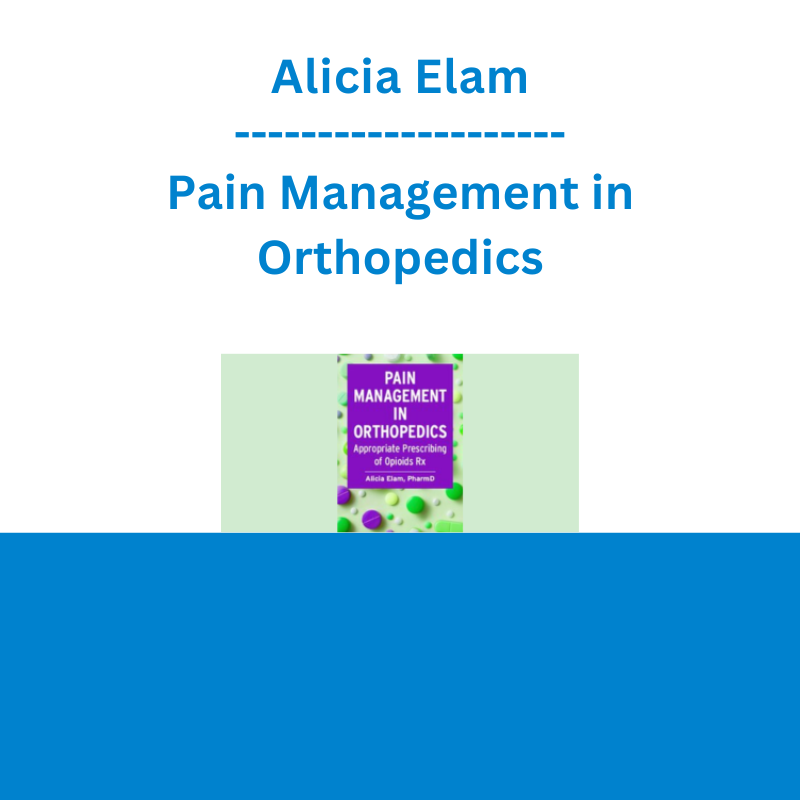*** Proof of Product ***
Exploring the Essential Features of “Alicia Elam – Pain Management in Orthopedics”
Speaker: Alicia Elam, PharmD
Duration: 2 Hours
Format: Audio and Video
Copyright: May 30, 2024
Media Type: Digital Seminar
Description
Orthopedic clinicians encounter a diverse range of patients with varying degrees of pain severity and underlying conditions, necessitating a comprehensive approach to opioid prescribing. With a focus on alleviating pain while minimizing the potential for misuse and dependency, orthopedic providers strive to optimize patient outcomes.
Alicia Elam, PharmD, will share the very latest details you need to know for appropriate prescribing of opioids in the orthopedic patient and strategies to implement safe prescribing practices to provide effective pain relief while safeguarding patient well-being.
Speaker
Alicia Elam, PharmD, is a pharmacist and tenured associate professor of pharmacology at Augusta University’s College of Allied Health Sciences. Not only does she oversee admissions for the physician assistant program and relish mentoring students interested in advanced degrees in medicine, pharmacy, and allied health services, but she also directs pharmacology courses for PA students and consults for various academic programs, including nursing. Dr. Elam is responsible for keen insights and guideline updates for opioid prescribing. With over 28 years of pharmacology experience, her expertise is further underscored by her services as a Lieutenant and Medical Services Corps Pharmacy Officer in the US Navy.
Speaker Disclosures:
Financial: Alicia Elam has an employment relationship with Augusta University. She receives a speaking honorarium from PESI, Inc. She has no relevant financial relationships with ineligible organizations.
Non-financial: Alicia Elam is a member of the Georgia Pharmacist Association, the Physician Assistant Education Association, National Pharmaceutical Association, and the Georgia Association of Physician Assistants.
Objectives
- Differentiate between acute, subacute, and chronic pain, and recognize inappropriate uses of opioids for subacute or chronic pain.
- Demonstrate proficiency in pre-prescription screening assessments and recognize red flags for opioid misuse during patient evaluations.
- Incorporate strategies to prevent opioid overdose, including educating patients on overdose risk factors, implementing measures to reduce overdose risk, and providing naloxone to patients and caregivers when appropriate.
- Apply evidence-based practices for safe opioid dosing, including guidelines for initiating opioid therapy, individualized dosing considerations based on patient factors, and monitoring for signs of opioid tolerance and toxicity during treatment.
Outline
Application of Pain Management Guidelines
- The CDC Pain Management Guidelines – advocating tailored care for patients
- CDC’s current Opioid Prescribing Guidelines
Safe & Effective Opioid Prescribing Practices
- Guidelines for initiating opioid therapy
- Individualized dosing considerations
- Standardized protocols for opioid prescribing
- Utilize pain assessment tools
Prioritization & Maximization of Non-Opioid Therapies
- Maximize nonopioid treatments such as NSAIDs and acetaminophen
- Efficacy and benefits of combination therapies to reduce reliance on opioids
Education and Informed Decision Making:
- Provide comprehensive education to patients and caregivers
- Ensure patients and caregivers adhere to safe practices for opioid use
Ongoing Evaluation & Adjustment of Opioid Treatment Plans
- Establish follow-up plans to monitor patient progress
- Continuously reassess treatment goals and make necessary adjustments
- Evaluate the risks and benefits of opioid therapy, including specific guidelines for extended release/long-acting opioids and the use of strong oral opioids for severe pain
Please see the full list of alternative group-buy courses available here: https://lunacourse.com/shop/









